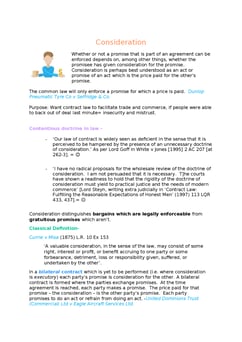Allcard v Skinner [1887] 36 Ch 145
Judgement for the case Allcard v Skinner
KEY POINTS
Undue influence is when one person exerts excessive pressure on another to manipulate their decisions, often invalidating contracts or wills. Rules are typically enforced within religious institutions, like monasteries and convents, where members vow to live in poverty and obey religious authorities.
Voluntary gift of property is when someone willingly transfers ownership of their assets to another without coercion or undue influence.
Laches is a legal doctrine where unreasonable delay in asserting a legal right can result in the loss of that right, impacting legal cases.
Acquiescence in legal matters occurs when one party accepts or tolerates another's actions or rights over time, potentially leading to a loss of legal claims or objections.
Convent refers to a religious institution typically governed by specific laws and regulations, while in religious contexts, it's a place where nuns live in a community devoted to prayer and service.
FACTS
In 1868, A. was introduced to S. by N., her spiritual director and confessor, and became an associate of a charitable sisterhood. N. founded the sisterhood and as its spiritual leader, dedicated to charitable endeavors.
In 1871, A. joined the sisterhood as a professed member, committing to rules of poverty, chastity, and obedience formulated by N. The rule of poverty required members to give up property, favoring the sisterhood's interests. The rule of obedience mandated members to follow their superior's guidance, and seeking advice from outsiders was forbidden.
Shortly after joining, A. made a will bequeathing her property to S. In 1872 and 1874, she transferred significant assets to S.
A. left the sisterhood in May 1879, revoking her will, but didn't seek property return until 1885. In 1885, A. initiated legal action, alleging undue influence by S. during property transfers, seeking asset return.
JUDGEMENT
A. initially intended to donate her fortune to the sisterhood but made gifts while under the influence of S. and N., subject to the sisterhood's rules. She had the right to reclaim the remaining property upon leaving, but not what had been used by the sisterhood.
The Court of Appeal, except for Cotton, L.J., upheld Kekewich, J.'s decision, citing A.'s laches and acquiescence as grounds to bar her claim after leaving the sisterhood.
COMMENTARY
A. joined a charitable sisterhood in 1868 under the guidance of N., the founder and spiritual leader. In 1871, A. became a full member, following rules of poverty, chastity, and obedience set by N., which favored the sisterhood's interests.
Shortly after joining, A. made a will to favor S. and transferred significant assets. She left the sisterhood in 1879, revoked her will in 1885, and sued, claiming undue influence by S. on the gifts.
Although A. initially intended to donate her fortune, she acted under S. and N.'s influence and the sisterhood's rules when making gifts. She had the right to reclaim the remaining property upon leaving, but not what the sisterhood had used. The Court of Appeal, except for Cotton, L.J., upheld Kekewich, J.'s decision, citing A.'s delay and acceptance of the situation as reasons to reject her claim after leaving the sisterhood.
ORIGINAL ANALYSIS
Plaintiff joined a convent and agreed to give all her property to the convent in her will. She later left the convent and claimed back the property pledged to the convent, stating that she had assigned it under undue influence.
CA held that although P was subject to the undue influence of Defendant, her delay in reclaiming her property amounted to a delay.
Cotton LJ
-
There are two cases where undue influence can be raised:
Where the gift was the result of another’s influence,. Expressly used for that purpose, OR
Where the relations between Plaintiff and Defendant at the time or shortly before the time of the gift raise a presumption that the donee had influence over the donor. Unless the donor gave the gift in circumstances where he could genuinely exercise free will, the gift is set aside.
Lindley LJ
-
There are two classes of undue influence:
Where there has been unfair/improper conduct/coercion/cheating on the part of the donee who is in a confidential relationship with the donor.
Where the duty of the donee is to advise the donor or manage his property for him.
In scenario 2 the burden of proof is on Defendant to show that he has not abused his position of trust. This case fell into scenario 2 (despite being affirmed later on) because Plaintiff was absolutely in Defendant’s power, was not allowed to consult externs etc. and therefore could not give the gift except by Defendant’s influence.
----
McKendrick: In this case the CA is “presuming undue influence” i.e. they look to the circumstances and say that in this case there could not have been a freely made gift. This is not the same as actual undue influence.
RELATED CASES
For Further Study on Allcard v Skinner

Contract law notes fully updated for recent exams at Oxford and Cambrid...
Need instant answers? Our AI exam tutor is here to help.
Ask questions 🙋 Get answers 📔 It's simple 👁️👄👁️
Our AI is educated by the highest scoring students across all subjects and schools. Join hundreds of your peers today.
Get StartedSimilar Cases
Related Product Samples
These product samples contain the same concepts we cover in this case.
| Contract Law | Undue Influence 1 Notes (12 pages) |
| Contract Law | Undue Influence And Unconscionability Notes (13 pages) |

 Since 2010, Oxbridge Notes has been a trusted education marketplace, supplying high-quality materials from top achievers at universities like Oxford, Cambridge, LSE, Harvard, and Yale.
Since 2010, Oxbridge Notes has been a trusted education marketplace, supplying high-quality materials from top achievers at universities like Oxford, Cambridge, LSE, Harvard, and Yale.